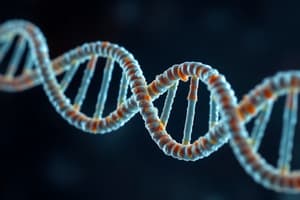Podcast
Questions and Answers
What is the main molecule responsible for carrying genetic information?
What is the main molecule responsible for carrying genetic information?
DNA
What are the two main types of cells found in biological systems?
What are the two main types of cells found in biological systems?
Prokaryotic cells and Eukaryotic cells
Name the four main building blocks of DNA.
Name the four main building blocks of DNA.
Adenine (A), Thymine (T), Guanine (G), Cytosine (C)
Which type of cells are more complex, prokaryotic or eukaryotic?
Which type of cells are more complex, prokaryotic or eukaryotic?
What is the branch of science that deals with the study of living organisms and their interactions?
What is the branch of science that deals with the study of living organisms and their interactions?
Explain the importance of understanding microbiology in relation to human health.
Explain the importance of understanding microbiology in relation to human health.
How does ecology contribute to our understanding of ecosystem function?
How does ecology contribute to our understanding of ecosystem function?
Discuss the role of genetics in investigating trait inheritance.
Discuss the role of genetics in investigating trait inheritance.
Explain the significance of neuroscience in understanding human behavior.
Explain the significance of neuroscience in understanding human behavior.
How does plant biology contribute to our knowledge of energy conversion processes in plants?
How does plant biology contribute to our knowledge of energy conversion processes in plants?
Flashcards are hidden until you start studying
Study Notes
Biology: Exploring the Unseen World Within Us
Biology is the branch of science that deals with the study of living organisms, their structure, function, growth, reproduction, evolution, distribution, and interaction with each other and the world around them. It is an interdisciplinary field that combines aspects of chemistry, physics, geology, mathematics, and other sciences.
Key Components of Biological Systems
Biological systems are composed of cells, which are the basic building blocks of life. These cells contain genetic material called DNA, which carries the information necessary for all cellular processes. There are two main types of cells: prokaryotic cells (found in bacteria) and eukaryotic cells (found in plants, animals, fungi, and protists). Eukaryotic cells are much more complex than prokaryotic ones, containing a true nucleus and various organelles that perform specific functions within the cell.
Genetics and DNA
The study of genetics deals with the transmission of genetic characteristics from parents to offspring. DNA (deoxyribonucleic acid) is the molecule responsible for carrying this information. It consists of four main building blocks called nucleotides: adenine (A), thymine (T), guanine (G), and cytosine (C). The sequence of these nucleotides determines the genetic code and ultimately the traits expressed by an organism.
Cellular Processes
Cells carry out several essential processes to maintain life, such as respiration (the process of converting oxygen and food into energy through cellular respiration), homeostasis (the maintenance of a stable internal environment), growth (the increase in size and development of cells), reproduction (the production of new cells to replace dead or damaged ones), and cellular communication (the exchange of signals between cells to coordinate their activities).
Subfields of Biology
Biology encompasses numerous specialized fields, each focusing on particular aspects of living organisms and their interactions with the world around them. Some of these areas include:
Microbiology
Microbiology studies microorganisms like bacteria, viruses, fungi, and protozoans. These tiny inhabitants can range from beneficial to harmful, and understanding their biology is crucial for developing methods to control diseases and improve health.
Ecology
Ecology explores how organisms interact with one another and their environment. This includes studying relationships between species (e.g., predation, competition, mutualism), population dynamics, community structure, and ecosystem function.
Evolution
Evolution examines the changes in species over time due to natural selection, gene flow, mutations, and other factors. By analyzing fossils and comparing genomes, scientists can reconstruct the history of life on Earth and understand how different organisms have adapted to their environments.
Genetics
Genetics investigates the inheritance of traits within and among populations. Techniques used in genetics research include crossbreeding, pedigree analysis, and molecular approaches that allow scientists to manipulate genes directly.
Neuroscience
Neuroscience focuses on studying the nervous system, including its structure, function, and behavior. Research in this area helps us understand how we think, feel, and respond to our surroundings.
Plant Biology
Plant biology explores the structure, function, and reproduction of plants. This field also examines how plants interact with other organisms and their environment, as well as the processes involved in photosynthesis (the conversion of sunlight into energy) and respiration (the transformation of food into energy).
Zoology
Zoology studies animals, including their anatomy, physiology, behavior, diversity, distribution, and adaptation to different habitats. Researchers may focus on specific groups like mammals, birds, reptiles, or insects, or investigate broader themes such as conservation biology and animal welfare.
Conclusion
Biology is a rich and diverse field that offers endless opportunities for exploration and discovery. From understanding the intricacies of our own bodies to uncovering the mysteries of the natural world around us, biology provides valuable insights into life itself. As research continues to advance, we will undoubtedly discover new wonders and gain even more appreciation for the complex web of connections that bind all living things together.
Studying That Suits You
Use AI to generate personalized quizzes and flashcards to suit your learning preferences.




